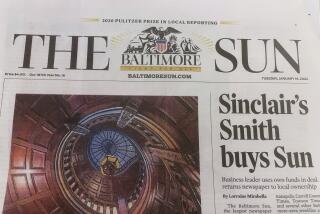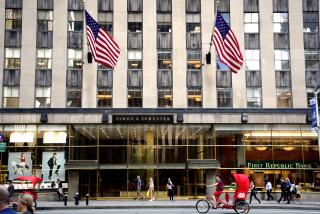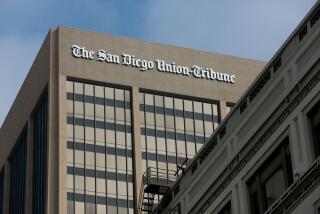Times’ owner casts its lot with real estate magnate
- Share via
Sam Zell’s plan to buy Tribune Co. would put one of the nation’s largest public media companies into the hands of a maverick investor with little experience in the business but a belief that there’s still money to be made in newspapers and television.
The $8.2-billion deal would give the Chicago real estate magnate virtual control of the Los Angeles Times, KTLA-TV Channel 5, the Chicago Tribune, cable TV network Superstation WGN and about 30 other daily papers and TV stations. Perhaps the biggest surprise in Chicago, the company’s hometown, was the news that the beloved Chicago Cubs would be sold at the end of the baseball season that started Sunday.
The Tribune deal faces obstacles, the biggest of which could be winning regulatory approval from the Federal Communications Commission. The FCC might force Zell to sell newspapers or television stations in some markets, including Los Angeles, because of federal rules preventing a concentration of ownership in any one location.
The 159-year-old Tribune also left the door open to new offers by setting a penalty payment of only $25 million in the event that the company kills the deal with Zell -- compared with the hundreds of millions of dollars that typically must be paid when backing out of such agreements.
It remains possible that pieces of the company could be sold, although Zell initially said he planned to keep the company intact. Los Angeles entertainment tycoon David Geffen said he maintained a keen interest in acquiring The Times.
“I think there is an opportunity for Tribune Co. of Chicago to maximize shareholder value,” said Geffen, whose $2-billion offer for the paper was rejected last year.
Tribune Chief Executive Dennis J. FitzSimons appeared relaxed and upbeat when he met Monday with an auditorium full of employees at the company’s landmark Tribune Tower. Tired after a six-month auction that ended late Sunday night, he nonetheless smiled broadly.
FitzSimons remarked on Zell’s business acumen but added that he wasn’t sure that the Tribune board knew exactly what the investor had planned. “I don’t know if we heard Sam Zell’s vision for the company,” FitzSimons said.
Zell had left his sprawling weekend home on Broad Beach in Malibu late Sunday to return to Chicago. He declined interview requests but released a statement.
“I am delighted to be associated with Tribune Co., which I believe is a world-class publishing and broadcasting enterprise,” Zell said. “As a long-term investor, I look forward to partnering with the management and employees as we build on the great heritage of Tribune Co.”
The deal, which values all of Tribune at about $13 billion, counting its nearly $5 billion of existing debt, would give Zell control, in partnership with a newly formed employee stock ownership plan. Using an ESOP to borrow the money to take Tribune private has substantial tax benefits. With 21,000 employees and revenue of $5.5 billion, Tribune is a major presence in about two dozen cities where it owns a newspaper, a television station or both. In those communities, in particular, Monday’s announcement was big news.
At El stops and on talk radio, Chicagoans fretted about the future of their beloved Cubbies. In Los Angeles, many civic activists expressed disappointment that a local buyer had not prevailed to take control of The Times and KTLA, though most said they were ready to give Zell a chance.
Los Angeles Mayor Antonio Villaraigosa said the new owner had “bought more than a media company” and called The Times “one of America’s greatest newspapers.”
“They’ve assumed a fundamental obligation to maintain the highest standards of journalistic excellence and public service,” he said.
Although the paper has won numerous awards and wide acclaim as one of the nation’s best, its marriage with Tribune has been a troubled one. Tribune acquired The Times in 2000 as part of an $8-billion purchase of Times Mirror Co., which had been controlled by the Chandler family.
Over a recent two-year period, the paper lost two publishers and two editors, largely because of their complaints that the parent company was cutting the editorial staff excessively. At its peak, the paper employed about 1,200 journalists. Its staff has dropped to about 940 but remains one of the largest in the country. About 50 more newsroom employees are expected to lose their jobs in upcoming reductions.
Such cutbacks have become common in the news business, and other Tribune outlets will also face reducing their workforces.
FitzSimons, asked to stay on to run the company, stressed that Tribune was determined to maintain high standards despite declining revenues.
“What will not change? Our commitment to great journalism and also our customer and community focus,” FitzSimons said. “That is what has created lots of value for the company over time.”
He also said he thought that the company’s move “out of the glare of the public markets” would give it more freedom to plan for the long term, a position seconded by at least one analyst.
Shareholders would receive $34 a share, a 3.6% premium over the stock’s Monday closing price of $32.81. The shares had been languishing at less than $30 before rumors of the impending deal.
The auction, which Tribune had hoped would conclude by the end of 2006, was extended through the first quarter of 2007 because of lukewarm interest from potential buyers. Some who had shown initial interest retreated as newspaper ad revenues continued a prolonged sag in the first months of the year.
Tribune missed a second self-imposed deadline by two days, with company directors deliberating late into the night Sunday, by conference call, to reach a final decision. By the time of those deliberations, the board had snubbed an 11th-hour attempt by Los Angeles billionaires Ron Burkle and Eli Broad to rejuvenate interest in their counteroffer.
Although Broad and Burkle also valued their proposal at $34 a share, Tribune executives said Zell’s proposal was more fully formed. The special committee of seven directors supervising the auction sent a letter to Broad and Burkle rejecting their claim that Zell had been given special inside information that allowed him to mount a superior bid.
Zell is a twice-divorced father of three, now married for a third time. His deal-making panache emerged early in life. He grew up in Chicago and Highland Park, Ill., making some of his first heady paydays by buying Playboy magazines downtown and selling them to his suburban Hebrew School classmates -- at a 200% markup.
One early venture into real estate, in the 1970s, almost became the costliest of Zell’s career. He was indicted on alleged tax fraud in a deal involving a Nevada high-rise and a Caribbean bank. Federal prosecutors dropped a felony charge against Zell when he agreed to testify against his codefendants. His brother-in-law went to jail but said he bore no ill will toward Zell.
Even as he was making his first inquiries about Tribune in February, Zell was completing what would become the second-largest leveraged buyout in history -- the sale of his Equity Office Properties to Blackstone Group for $23 billion. Though best known for building the largest portfolio of office buildings in America, he has also tried his hand at investments in bicycles, barges, mattresses and airplane rivets.
One previous media play, the 1993 purchase of Jacor Communications Inc. out of bankruptcy, proved a blockbuster. He claimed in an interview with Barron’s to have pocketed $1.3 billion on an initial investment of $70 million when he sold the radio station chain to Clear Channel Communications Inc. in 1999. Forbes puts his net worth at $4.5 billion.
Zell has long been an outlier among Chicago’s staid, WASP-y business elite. He is bearded, sometimes profane, and fancies Ducati motorcycles, leather jackets and rousing games of paintball. He is less known on the West Coast but maintains a stylish John Lautner-designed home on a rocky point in Malibu, worth at least $14 million.
Zell is a political independent who has hosted fundraisers for Gov. Arnold Schwarzenegger, but he has given nearly equally to both political parties. Since the 1990 election, Zell has donated $181,500 to federal campaigns, parties and PACs, 49% to Democrats and 47% to Republicans, according to the Washington-based Center for Responsive Politics. President Bush and Democratic nominee Sen. John F. Kerry each received $2,000 in the 2004 presidential race.
Tribune is the latest in a wave of media companies that have gone private, at least partly to adjust to competitive challenges. Cable-TV veteran and private equity investor Leo J. Hindery Jr. predicted that high debt would come back to bite some of the most debt-laden companies, including Tribune.
“These businesses can be very cyclical and greatly at risk from technological changes, regulatory changes and changes in taste,” he said.
But veteran newspaper analyst John Morton agreed with FitzSimons that the move to private ownership could give Tribune more breathing room to plot a long-term strategy. “Assuming Tribune still wants to publish decent newspapers and operate decent TV stations, being private is an advantage,” Morton said.
*
thomas.mulligan@latimes.com
*
(BEGIN TEXT OF INFOBOX)
Details of the deal
Key terms of Sam Zell’s accord with Tribune Co.:
The deal is valued at $13 billion, including $5 billion in existing Tribune debt.
Tribune stockholders will receive $34 a share.
Zell will invest $315 million in the company.
The company will go private.
An employee stock ownership plan will own the company, with Zell holding an option to acquire as much as 40% of all shares.
The Chicago Cubs will be sold at the end of the 2007 season.
Zell will become chairman of the board.
The transaction is expected to close in the fourth quarter of 2007.
Times research
**
Players in the Tribune drama
How the players fare in the Tribune deal.
Sam Zell: The 65-year-old Chicago real estate mogul, nicknamed the “Grave Dancer” for his history of buying distressed properties, emerged in February as a late entrant in the bidding for Tribune. Under the terms of his winning $8.2-billion proposal, Zell will invest $315 million in cash in the company, become chairman of the board and get the right to buy 40% of Tribune later for an additional investment.
Chandler family: The former owners of the Los Angeles Times -- and Tribune’s largest shareholder -- will sell their 20% stake in Tribune under the Zell deal and exit the newspaper business after 125 years. The Chandlers’ $7.6-billion proposal to Tribune in January would have spun off the company’s 23 TV stations into a separate entity.
Chicago Cubs: Purchased for $20.5 million in 1981, the baseball team will be sold by Tribune at the end of the 2007 season. Analysts estimate that the Cubs could fetch $500 million to $750 million.
Tribune management: Top executives will be able to cash in more than $49 million of Tribune stock when Zell takes the company private.
Eli Broad and Ron Burkle: The Los Angeles billionaires separately had expressed interest in buying The Times in July 2006, then teamed up to submit a bid for Tribune in November. Last week they raised their bid to $34 a share but were unable to top Zell, who matched their price.
David Geffen: The entertainment billionaire submitted a $2-billion offer in December to buy The Times, but Tribune rebuffed bids for individual assets. He said Monday that he was still interested in buying the paper.
Tribune employees: Zell will form an employee stock ownership plan to take the company private, making Tribune employees his partners. Tribune Chief Executive Dennis J. FitzSimons said Monday that there would be additional reductions in the company’s workforce of 21,000 people.
Source: Times research by Scott Wilson
**
What’s ahead
Sam Zell, a motorcycle-riding billionaire, is a takeover artist who specializes in distressed properties. By the end of the year, the Chicagoan could be in charge of the company that owns the Los Angeles Times -- for an investment of as little as $315 million.
How the deal would work: With some cash from Zell, a whole lot of debt and an employee stock ownership program, Tribune would go private, freed from Wall Street’s scrutiny. C1
What might hold it up: Federal law says a company can’t own both a TV station and a newspaper in the same city. Tribune does just that in L.A. and four other markets. C9
What’s at stake: The hearts and minds of Times readers and local civic leaders, some of whom are suspicious of a rich out-of-towner at the reins. C1
But maybe he’s local after all: Zell and his wife own a Malibu retreat, where, neighbors say, they spend quiet weekends. C11
Steve Lopez, CALIFORNIA, B1
Tim Rutten, CALENDAR, E1
More to Read
The biggest entertainment stories
Get our big stories about Hollywood, film, television, music, arts, culture and more right in your inbox as soon as they publish.
You may occasionally receive promotional content from the Los Angeles Times.











